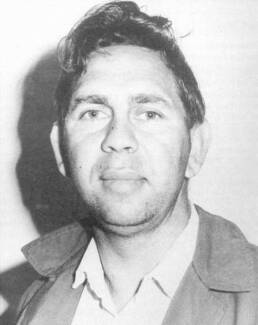These stories may contain descriptions of childhood trauma and abuse. Aboriginal and Torres Strait Islander people should be aware that this website may contain images, voices or names of people who may have passed away. If you need help, you can find contact details for some relevant services on our support page.
Aboriginal Australian activist, Ken Brindle (1931-1987), was in residential care as a child.
Kenneth Brindle was born to Mary Brindle in Sydney. He was a baby when he was placed in the United Aborigines Mission children’s home in Bomaderry, a small town around 158 km north of Sydney. He was later sent to Kinchela Boys Home on the land of the Dunghutti people near Kempsey, a town over 420 km north of Sydney in the Mid North Coast region of NSW.
Kinchela was intended to provide training for boys as farm labourers; instead of school, Ken worked at a local farm for more than seventy hours a week. He rebelled by running away.
In 1952, Ken Brindle joined the Australian Regular Army. He served in the Korean War and was discharged in 1955. Serving in the army was Brindle’s first experience of being treated as an equal.
Ken Brindle lived at Redfern in Sydney with his partner, Mavis Goode, and worked for various organisations including the Aboriginal section of the Department of Adult Education at the University of Sydney.
In 1960, Brindle was instrumental in the revival of the Redfern All Blacks Rugby League Club. There had been an All Blacks Club in Redfern from the 1940s which encouraged Aboriginal men into Sydney, “even if just for the football season” (Hartley, 152), but competitive games in the South Sydney Junior League were erratic and disappeared after the 1956 competition. The club began competing in the South Sydney Junior competition from 1961 although there was another pause in 1964.
Brindle’s intentions with the All Blacks were to encourage boys who’d migrated to the city from the country to get involved in social activities rather than in crime; it was an opportunity for the boys and young men to gain confidence and a sense of responsibility and pride.
Brindle contributed to the club’s campaigns against discrimination by the NSW police, entrenched and widespread at the time. He sued the police in 1963 and was awarded damages of £400, a win that signalled a small shift in relationships between the police and the local Aboriginal Australian community.
From 1968 for four years, Brindle served as secretary for the Federal Council for the Advancement of Aborigines and Torres Strait Islanders, again contributing to campaigns against discrimination, including against the Aborigines Protection Act 1935. He also acted as a trustee for five years from 1969 for the Aboriginal Children’s Advancement Society
Ken Brindle was a founding member of the Aboriginal Education Council (AEC) (NSW) in 1963 and served as vice president. In 1983 the AEC founded the Ken Brindle Memorial Awards, scholarships for teaching degrees, although the scholarships have since ceased due to a lack of funding.
The Kinchela Boys Home Ken Brindle Memorial Shield continues to be awarded to the most outstanding player in the annual NSW Aboriginal Knockout Rugby league competition, a state-wide competition—beginning in 1971—to showcase the many talented Aboriginal players in NSW.
References:
Brignell, Lyn. “Brindle, Kenneth (Ken) (1931-1987).” Australian Dictionary of Biography, National Centre of Biography, vol.17, 2007. https://adb.anu.edu.au/biography/brindle-kenneth-ken-12255
Hartley, Jackie. “Black, White … and Red? The Redfern All Blacks Rugby League Club in the Early 1960s.” Labour History, (2002): 149-171.
“Kinchela Training Home for Aboriginal Boys (1923-1970). Find & Connect, 2021. https://www.findandconnect.gov.au/guide/nsw/NE00955
Lucas, Damian. “Breaking the Silence that Silences: A Time of Challenge and Change in Aboriginal/Police Relations, the 1960s and 1970s.” Current Issues in Criminal Justice, vol. 7 (1995).
McCarthy, Ann. “United Aborigines Mission (1895-2019?).” Find & Connect, 2020. https://www.findandconnect.gov.au/ref/sa/biogs/SE00139b.htm
NITV Staff Writers. “NITV remembers: Ken Brindle.” NITV, 20 October 2016. https://www.sbs.com.au/nitv/article/2016/10/19/nitv-remembers-ken-brindle
Norman, Heidi. “A modern day Corroboree: towards a history of the New South Wales Aboriginal Rugby League Knockout”. Sport in Society, vol. 15 (2012).
Image available here.
